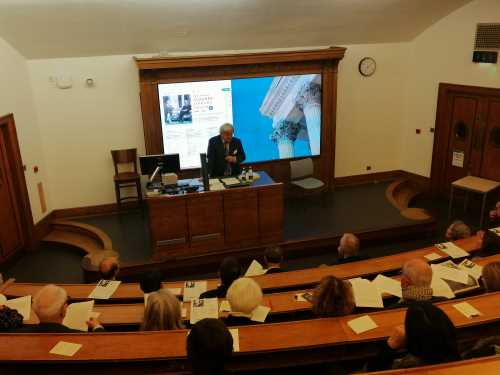Jiménez Fraud returns to London, Oxford and Cambridge with the publication of Epistolary
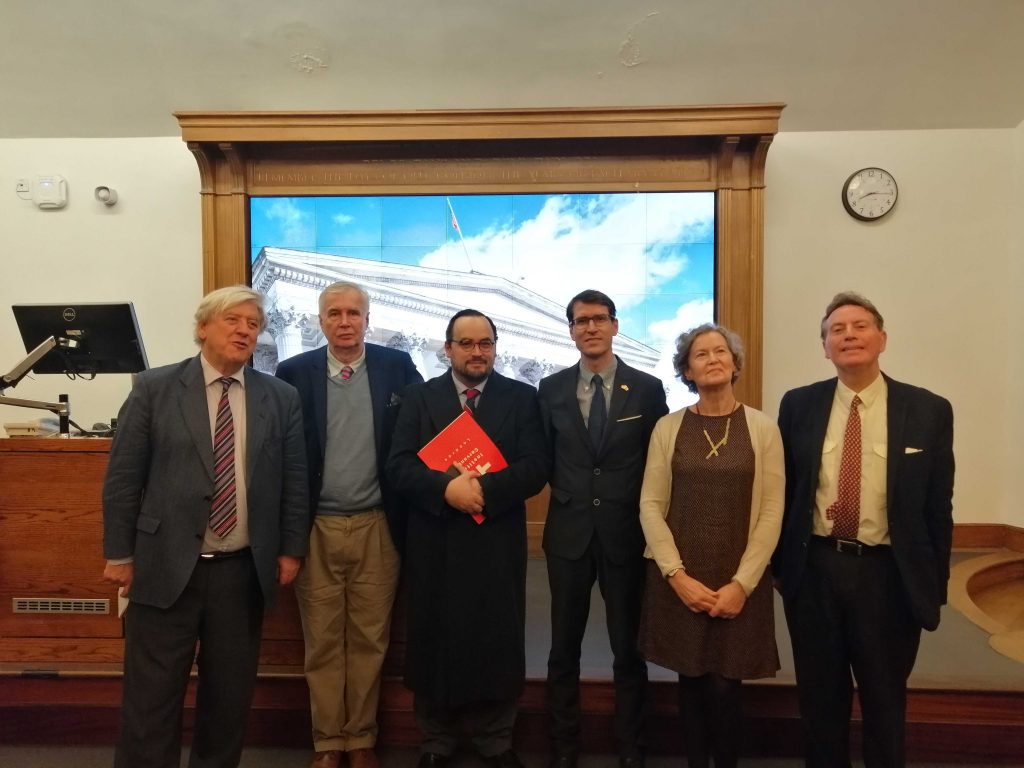
The United Kingdom hosted the presentation of the Epistolary (1905-1964) of Alberto Jiménez Fraud over three days of events in London, Oxford and Cambridge. The events were organised by Magdalen College alongside la Residencia de Estudiantes and the Free Institution of Education in collaboration with the Ministry of Education of the Embassy of Spain in the United Kingdom. Instituto Cervantes in London also collaborated as part of the ongoing celebrations for the 80th anniversary of the Spanish Republican exile.
Jiménez Fraud directed the Residencia de Estudiantes from its foundation in 1910 until 1936 when it became, according to Julio Caro Baroja, the first cultural centre in Spain. Throughout those decades Fraud mentored several generations of university students including, Severo Ochoa, Dalí, García Lorca or Buñuel, among many other exceptional residents. They presented theories at the Residencia, talking and working with some of the most outstanding International intellectuals, scientists and creators of the moment: Albert Einstein, Marie Curie, Walter Gropius, Paul Valéry, Alexander Calder.
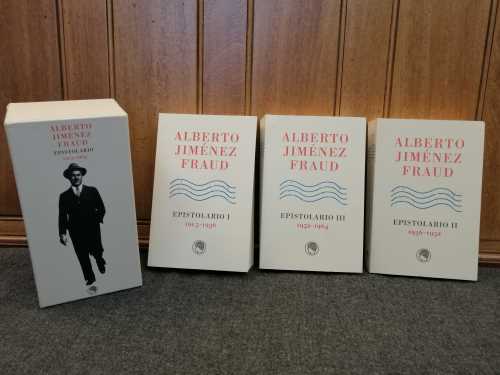
Exile in England
The outbreak of the Spanish Civil War forced the Residencia to stop its activity and forced Jiménez Fraud into exile with his family. They fled to England where he worked as a Lecturer in the Sub-Faculty of Spanish at the University of Oxford.
The Epistolary is a collection of over two thousand letters, offering an insight and new data into the modernisation of Spanish society and its recovery process in post-war Spain. The letters present an overview of the culture of the twentieth century through their multiple correspondents and dialogues.
The protagonists of Spanish and European intellectual history parade through its pages as close family and friends of Jiménez Fraud such as his teacher Giner de los Ríos. The list is long and impressive, including letters from: Manuel B. Cossío, José Moreno Villa, Zenobia Camprubí, Juan Ramón Jiménez, Natalia Cossío or Gloria Giner, along with Ortega and Gasset, Unamuno, Falla, Ramón y Cajal, Menéndez Pidal, María de Maeztu and Américo Castro.
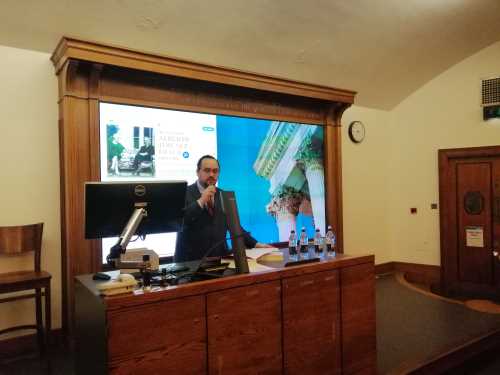
“The collection of letters gathered in the Jiménez Fraud Epistolary is an impressive academic work that deserves all forms of praise for both publishers and publishing houses, since it is an outstanding contribution to Spanish intellectual and cultural history during the twentieth century, and it is also a very interesting book from the point of view of Spanish-British relations,” said the director of Instituto Cervantes in London, Ignacio Peyró.
Elisa Navas, director of the Francisco Giner de los Ríos Foundation, stressed the importance of the three volumes of the Alberto Jiménez Fraud Epistolary, for the abundant information hitherto unknown about the modernisation project born from the Free Institution of Education of which the Residencia was an emblem.
Jiménez Fraud’s letters, which fluctuate between public and private, are included in the collection of epistolary published by the Residencia, in an attempt to achieve the most complete body of correspondence of the most relevant figures of the so-called Age of Silver of the Spanish culture: the period from 1868 to 1936, the brightest period after the Golden Age.
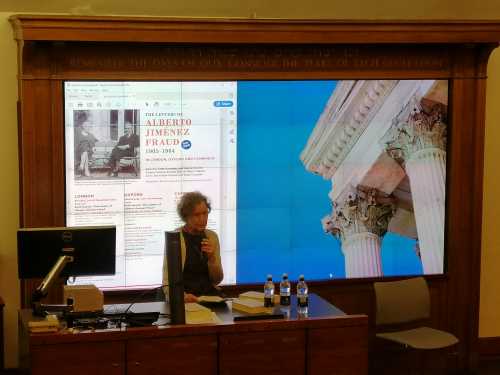
For Navas, the epistolary meets the rescue objective that encouraged the life and work of Jiménez Fraud when he had to leave the Residencia in September 1936, considering it essential to recover the memory of the institutions and the transmission of his legacy to the new generations of Spaniards, with the dream that one day they could reap their fruit in a free and democratic Spain.
García-Velasco and Valender
For José García-Velasco, the Higher Council for Scientific Research has always been linked to the Residencia. He explained how Jiménez Fraud’s struggle to recover the Residencia project until his death in 1964 informed the entirety of his exile in England. His legacy is still alive in the current Residencia de Estudiantes and the Free Institution of Education, both restored the Spanish democratic and European generations.
García-Velasco also stressed the value and importance of the precious testimonies in the epistolary of Jiménez Fraud. The first volume includes letters written during the period prior to the Spanish Civil War, and the following volumes, with correspondence between Jiménez Fraud and its recipients reflecting on the events that occurred between 1910 and 1636 since his exile.
In addition, García-Velasco mentioned the scholarship programme created by the Board for the Expansion of Studies, between 1907 and 1936, which granted about 3,000 scholarships (then called pensions) to centres of excellence in Europe and the United States. Thanks to these networks, the Residencia served as host to prestigious figures of the contemporary academic, scientific and artistic fields.
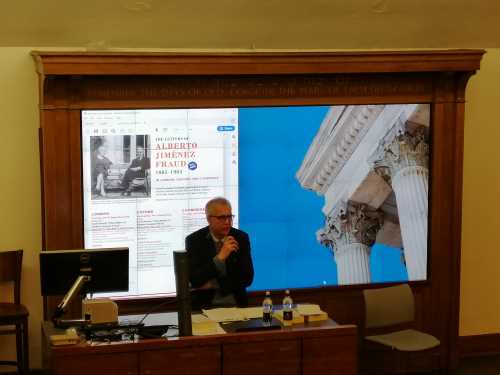
For his part, the Spanish literature professor at El Colegio de México and respected hispanist, James Valender, highlighted the value of the individual as well as the community angles represented by Jiménez Fraud in his letters. “Don Alberto (as his colleagues call him), is undoubtedly one of the figures who did more to promote Spanish culture and education in the first half of the twentieth century and was also a man who fled from fame and public recognition with the same determination with which others, with much less merit than him,” said Valender.
